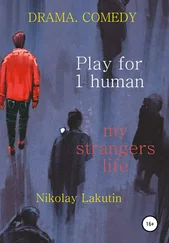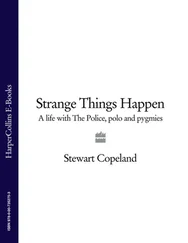Douglas Hofstadter - I Am a Strange Loop
Здесь есть возможность читать онлайн «Douglas Hofstadter - I Am a Strange Loop» весь текст электронной книги совершенно бесплатно (целиком полную версию без сокращений). В некоторых случаях можно слушать аудио, скачать через торрент в формате fb2 и присутствует краткое содержание. Жанр: Прочая документальная литература, на английском языке. Описание произведения, (предисловие) а так же отзывы посетителей доступны на портале библиотеки ЛибКат.
- Название:I Am a Strange Loop
- Автор:
- Жанр:
- Год:неизвестен
- ISBN:нет данных
- Рейтинг книги:4 / 5. Голосов: 1
-
Избранное:Добавить в избранное
- Отзывы:
-
Ваша оценка:
- 80
- 1
- 2
- 3
- 4
- 5
I Am a Strange Loop: краткое содержание, описание и аннотация
Предлагаем к чтению аннотацию, описание, краткое содержание или предисловие (зависит от того, что написал сам автор книги «I Am a Strange Loop»). Если вы не нашли необходимую информацию о книге — напишите в комментариях, мы постараемся отыскать её.
I Am a Strange Loop — читать онлайн бесплатно полную книгу (весь текст) целиком
Ниже представлен текст книги, разбитый по страницам. Система сохранения места последней прочитанной страницы, позволяет с удобством читать онлайн бесплатно книгу «I Am a Strange Loop», без необходимости каждый раз заново искать на чём Вы остановились. Поставьте закладку, и сможете в любой момент перейти на страницу, на которой закончили чтение.
Интервал:
Закладка:
SL #642: Music is among the most meaningful things I know.
SL #641: And yet, are individual notes meaningful to you? For instance, do you feel attraction or repulsion, beauty or ugliness, when you hear middle C?
SL #642: I hope not! No more than when I see the isolated letter “C”.
SL #641: Is there any isolated note that on its own attracts or repels you?
SL #642: No. An isolated note doesn’t carry musical meaning. Anyone who claimed to be moved by a single note would be putting on airs.
SL #641: Yet when you hear a piece of music you like or hate, you certainly are attracted or repelled. Where does that feeling come from, given that no note in it has any intrinsic attraction or repulsion for you?
SL #642: It depends on how they are arranged in larger structures. A melody is attractive because of some kind of “logic” it possesses. Some other melody could be repulsive because it lacks logic, or because its logic is too simplistic or childish.
SL #641: That certainly sounds like a response to pattern, not like raw sensation. A piece of music can have great emotional meaning despite being made of tiny atoms of sound that have no emotional meaning. What matters, therefore, is the pattern of organization, not the nature of the constituents. This brings us back to your puzzlement about the difference between experiencers such as you and me, and non-experiencers such as dangling ropes and plastic floats. To you, this crucial difference must originate in some special ingredient, some tangible thing or substance, which experiencers have in their makeup, and which non-experiencers lack. Is that right?
SL #642: Something like that has to be the case.
SL #641: Then let’s call this special ingredient that allows experiencers to come into existence “feelium”. Unfortunately, no one has ever found a single atom or molecule of feelium, and I suspect that even if we did find a mysterious substance present in all higher animals but not in lower ones, let alone in mere machines, you would start wondering how it could be that any mere substance, inanimate and insensate on its own, could give rise to sensation.
SL #642: Feelium, if it existed, would probably be more like electricity than like atoms or molecules. Or maybe it would be like fire or radioactivity — in any case, something that seems living, something that by its very nature dances in crazy ways — not just inert stuff.
SL #641: When you painted a picture of the earth before life evolved, it had volcanoes, thunder and lightning, electricity, fire, light, and sound — even the sun, that great big ball of nuclear fusion. And yet you weren’t willing to imagine that the presence of such phenomena, in any combination or permutation, could ever give rise to an experiencer. Yet just now, in talking about the mysterious soul-creating essence I called “feelium”, you used the word “dance”, as in the phrase “dancing symbols”. Are you perhaps unwittingly changing your tune?
SL #642: Well, I can imagine a sparkling, firelike “dance” as being what distinguishes experiencers from non-experiencers. It’s even somehow appealing to me to think that the dancing of feelium, if it turned out to exist, might be able to explain the difference between experiencers and non-experiencers. But even if we came to understand the physics of how feelium produces experience, something crucial would still be missing. Suppose that the world were populated by experiencers defined by some kind of pattern involving feelium. Let’s even suppose that the pattern at the core of each experiencer were a strange loop, as you postulate. So now, because of this elusive but wonderful physical pattern executed at least partially in feelium, there are lots of “lights on” scattered around in special spots here and there in the universe. The sticking point remains: Which one of them is me ? What makes one of them different from all of the others? What is the source of “I”-ness?
SL #641: Why do you say you would be different from the others? Each one would cry out that it was different. You’d all be mouthing just the same thoughts. In that sense, you would all be indistinguishable!
SL #642: I think you’re teasing me. You know perfectly well that I’m not the same as anyone else. My inner fire is here, not anywhere else. I want to know what singles out this particular fire from all the others.
SL #641: It’s as I said before: you’re a satellite to your brain. Like a fireplace, a particular brain is in a particular spot. And wherever it happens to be, its resident strange loop calls that place “here”. What’s so mysterious about that?
SL #642: You’re not answering my question. I don’t think you’re even hearing my question.
SL #641: Oh, sure — I hear you. I here, you there!
SL #642: Ouch. Now just listen for a moment. My question is very straightforward. Anybody can understand it (except maybe you). Why am I in this brain? Why didn’t I wind up in some other brain? Why didn’t I wind up in your brain, for instance?
SL #641: Because your “I” was not an a priori well-defined thing that was predestined to jump, full-fledged and sharp, into some just-created empty physical vessel at some particular instant. Nor did your “I” suddenly spring into existence, wholly unanticipated but in full bloom. Rather, your “I” was the slowly emerging outcome of a million unpredictable events that befell a particular body and the brain housed in it. Your “I” is the self-reinforcing structure that gradually came to exist not only in that brain, but thanks to that brain. It couldn’t have come to exist in this brain, because this brain went through different experiences that led to a different human being.
SL #642: But why couldn’t I have had those experiences as easily as you?
SL #641: Careful now! Each “I” is defined as a result of its experiences, and not vice versa! To think the reverse is a very tempting, seductive trap to fall into. You keep on revealing your tacit assumption that any “I”, despite having grown up inside one particular brain, isn’t deeply rooted in that brain — that the same “I” could just as easily have grown up in and been attached to any other brain; that there is no deeper a connection between a given “I” and a given brain than the connection between a given canary and a given cage. You can just swap them arbitrarily.
SL #642: You’re still missing my point. Instead of asking why I ended up in this brain, I’m asking why I started out in that random brain, and not in some other one. There’s no reason that it had to be that one.
SL #641: No, you’re the one who’s missing the point. The key point, uncomfortable for you though it will be, is that no one started out in that brain — no one at all. It was just as uninhabited as a swinging rope or a whirlpool. But unlike those physical systems, it could perceive and evolve in sophistication, and so, as weeks, months, and years passed, there gradually came to be someone in there. But that personal identity didn’t suddenly appear full-blown; rather, it slowly coalesced and came into focus, like a cloud in the sky or condensation on a windowpane.
SL #642: But who was that person destined to be? Why couldn’t it have been someone else?
SL #641: I’m coming to that. What slowly came to pervade that brain was a complicated set of mental tendencies and verbal habits that are now insistently repeating this question, “Why am I here and not there ?” As you may notice, this brain here (mine, that is) doesn’t make its mouth ask that question over and over again. My brain is very different from your brain.
Читать дальшеИнтервал:
Закладка:
Похожие книги на «I Am a Strange Loop»
Представляем Вашему вниманию похожие книги на «I Am a Strange Loop» списком для выбора. Мы отобрали схожую по названию и смыслу литературу в надежде предоставить читателям больше вариантов отыскать новые, интересные, ещё непрочитанные произведения.
Обсуждение, отзывы о книге «I Am a Strange Loop» и просто собственные мнения читателей. Оставьте ваши комментарии, напишите, что Вы думаете о произведении, его смысле или главных героях. Укажите что конкретно понравилось, а что нет, и почему Вы так считаете.












